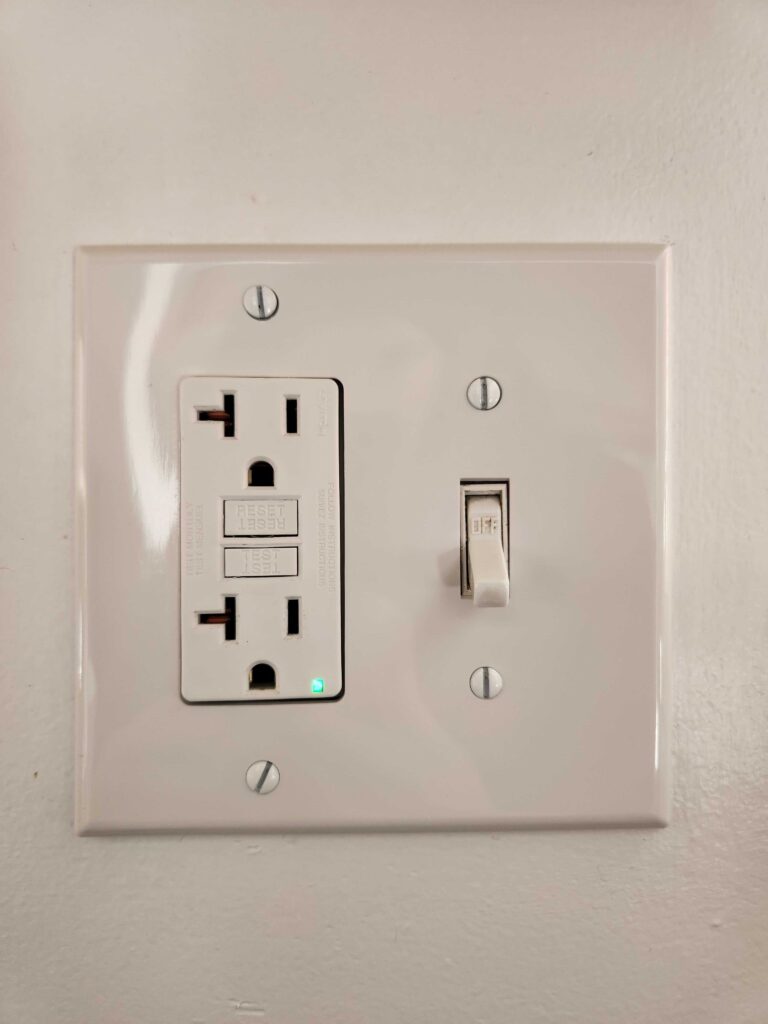A Homeowner’s Guide to GFCI vs. AFCI: What’s Required in Colorado Now?
The #1 Choice for Home Electrical and Power Solutions

If you’ve ever plugged something in and wondered why it keeps tripping the breaker, you’re not alone. Colorado homeowners are often confused by the difference between GFCI and AFCI protection—and with good reason. Electrical code updates have changed where each is required, leaving many unsure whether their home is fully up to code.
The good news: understanding these two devices doesn’t require an electrical engineering degree, and Professional Power is here to walk you through everything.
Once you know what they do, where they belong, and how to bring your home up to current Colorado regulations, you can protect your family and avoid unnecessary frustration.
What GFCI and AFCI Devices Actually Do
Let’s start with the basics.
GFCI (Ground Fault Circuit Interrupter) outlets and breakers prevent electrical shock. They sense when electricity is leaking outside the intended circuit—like through water or a person—and cut power instantly. That’s why you’ll find GFCIs in places where moisture is common, such as bathrooms, kitchens, laundry rooms, garages, and outdoor outlets.
AFCI (Arc Fault Circuit Interrupter) devices prevent electrical fires. They detect dangerous arcing, which happens when damaged or loose wiring sparks unexpectedly. Arcing can occur behind walls and go unnoticed until insulation starts to smolder. AFCIs shut power off before that happens.
Both devices save lives, but they protect against completely different hazards.
How Colorado Electrical Code Applies in 2025
Colorado follows the National Electrical Code (NEC), with local jurisdictions adopting updates at their own pace. The current NEC requires both GFCI and AFCI protection in most areas of the home, though specific rooms can vary depending on your city or county.
In general, here’s what applies under the most recent Colorado code adoptions:
- Bathrooms: Both GFCI and AFCI protection are required.
- Kitchens: Circuits serving countertop outlets and appliances need GFCI protection, and most also require AFCI.
- Laundry areas: Both forms of protection are required.
- Garages: Outlets and circuits must include GFCI and AFCI.
- Unfinished basements: GFCI is mandatory, and AFCI is typically required as well.
- Bedrooms and living areas: AFCI protection is required even if there’s no water present.
- Outdoor outlets: GFCI protection is required, while AFCI generally is not.
Because code enforcement can differ slightly by municipality, a licensed electrician familiar with GFCI and AFCI regulations in Colorado can confirm what applies in your area. Professional Power’s electrical safety experts stay current with every update to ensure your home meets local standards.
Myths About “Nuisance Trips”
One reason homeowners hesitate to upgrade is the belief that AFCIs or GFCIs trip too easily. Early models did sometimes react to harmless fluctuations, but newer technology is much smarter.
If a breaker still trips repeatedly, it’s usually signaling a genuine issue—like a loose wire, damaged appliance, or overloaded circuit. An electrical inspection can pinpoint whether the fault lies in your wiring or a device plugged into the outlet. Ignoring it risks both safety and compliance.
Retrofitting Older Homes
If your home was built before the early 2000s, it may not include either type of protection. Fortunately, retrofitting is straightforward. A qualified electrician can:
- Replace outdated outlets with GFCI receptacles in kitchens, baths, and outdoor areas.
- Install combination AFCI breakers in the main electrical panel for bedroom and living-area circuits.
- Upgrade older wiring during a rewiring project to ensure compatibility.
- Label circuits clearly so you know which protection is installed where.
These upgrades not only meet Colorado code but can also lower your risk of electrical fires and improve home resale value.
When to Combine GFCI and AFCI Protection
In some areas—such as laundry rooms, kitchens, and garages—code now requires both GFCI and AFCI protection. This can be achieved in one of two ways:
- Dual-function breakers, which combine both protections in a single device.
- GFCI outlets installed on circuits already protected by an AFCI breaker.
Your electrician will determine which method makes sense based on your home’s layout and electrical panel capacity. For homes running newer smart systems or backup generators, the setup can be integrated into a SPAN smart panel for better monitoring and control.
Labeling and Maintenance Tips
A few minutes spent labeling can save hours of frustration later. After any GFCI or AFCI upgrade, have your electrician mark each breaker or outlet clearly with its function and coverage area.
You should also:
- Test GFCI outlets monthly using the built-in “test” and “reset” buttons.
- Keep the panel area dry, clean, and accessible.
- Call for electrical repair if you notice frequent trips, warm outlets, or flickering lights.
Testing regularly ensures these safety devices keep doing their job quietly in the background.
Why Local Expertise Matters
Colorado’s high elevation, dry air, and temperature swings can stress wiring differently than in other regions. Local electricians understand how altitude affects voltage and how to protect circuits from static discharge in low-humidity environments.
A licensed electrician familiar with local permitting can ensure your upgrades pass inspection on the first attempt. Professional Power’s team routinely installs, replaces, and tests GFCI and AFCI systems in homes across Westminster, Brighton, and the greater Denver area.
They don’t just meet minimum code—they design electrical systems that last, protect, and perform.
Schedule a Code-Compliance Upgrade
If you’re unsure whether your home meets current GFCI and AFCI requirements, don’t wait until the next breaker trip to find out. A quick inspection can reveal outdated wiring, missing protection, or mislabeled circuits before they become serious hazards.
Professional Power can help you bring every outlet and circuit up to modern standards, from panel upgrades to whole-home safety checks.
Ready to make your home fully code-compliant? Book your inspection today and ensure your electrical system is safe, efficient, and ready for anything Colorado weather brings.
Call Now (720) 774-0192